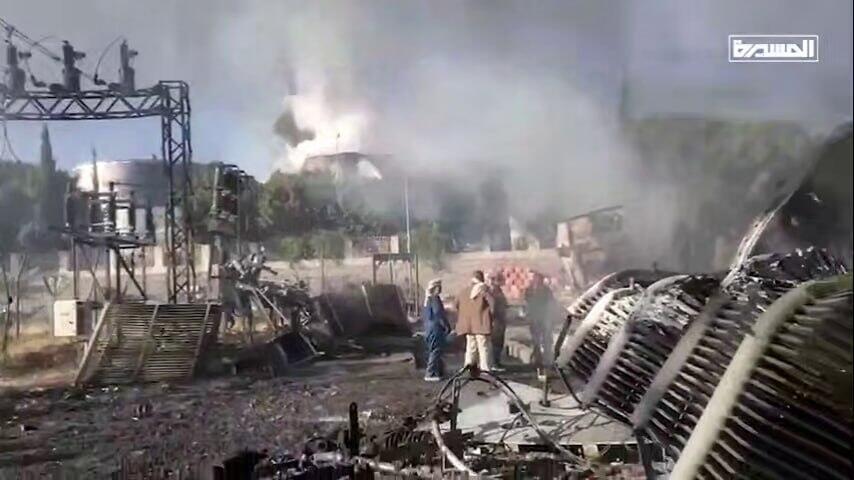Getting your Trinity Audio player ready...
Israel's strike on Houthi targets in Yemen early on Thursday exacted a heavy economic price on the rebel forces but also impacted their ability to lead. The attack was a humiliating blow after critical electrical power infrastructure was hit in Sanaa, Yemen's capital and the Iran-Proxy's stronghold. Unfortunately, this would not deter the Houthis from continuing their missile and drone strikes on Israel or on maritime routes that has caused financial damage to world trade.
The Houthis. A Shiite Jihadi ethnic and religious group insist on proving to the world that unlike Hezbollah, Hamas and Iran, they remain unscathed and continue to fight in support of Hamas. Along with Shiite militias in Iraq, they await a cease-fire in the war in Gaza.
3 View gallery


Abdul-Malik Badruldeen al-Houthi, Benjamin Netanyahu
(Photo: Khaled Abdullah/ Reuters, Alex Kolomoisky)
Israel strikes Houthi targets in Yemen
That is why the Houthis increased their attack in the past month but they are also euphoric over the military successes and fueled by their extremist Islamist ideology, expecting once the cease-fire in Gaza is agreed, to emerge victorious and be recognized as the force that held maritime traffic, including oil trade in the Persian Gulf in a strangle hold at a cost to the European consumers.
The Houthis care nothing about the Yemeni civilian population. They've proven that since their attack on Saudi Arabia in 2015 and the Saudi strikes that followed, killing many and causing starvation for tens of thousands of innocent civilians.
The American administration, then forced Saudi Arabia to cease their attacks and even removed the Houthis from the list of terror organizations, to allow humanitarian aid to be brought in through the Hodeida port, the same port Israel attacked in the early hours of the morning, for the third time since the war, causing it to shut down.
This all means that in order to deal with the Houthi threat to Israel's home front and to world trade, there must be a resolute military operation that will not only hurt the local economy and humiliate the Houthi regime, but its leaders, must also be eliminated and its military capabilities destroyed.
3 View gallery


Aftermath of Israel's strike on Houthi targets in Yemen
(Photo: Osamah Abdulrahman / AP)
The Houthis are not a primitive bunch of barefooted tribes but a real terrorist military forced that is well armed with the latest Iranian weapons, including drones and ballistic missiles and that it would not be enough to target defend against them but their production in Yemen – with Iranian knowhow, must also be stopped and their warehouses destroyed, so that they are no longer a problem for the world.
Israel and the American-led coalition in the Gulf must define the Houthis as a primary threat that must be dealt with the help of exact intelligence on the launch and production sites so that they may be destroyed. But Israel and even CENTCOM may not have that intelligence at hand.
Obtaining intelligence from a distance requires great efforts that it seems the Americans are not keen on making and Israel does not have the required resources needed to obtain it. The distance between Israel and Yemen is also a challenge and in the three attacks launched against the rebels there, the IDF jets had to refuel midway during the two-hour flight, needed command and control aircraft in the air, regional coordination and more.
Most of the Houthi launch sites and command centers are around Sanaa in Yemen's central region and hitting those targets requires the use of dozens of fighter jets, perhaps over 100, so that there are significant results. CENTCOM and the U.S. navy have such a large fleet of planes, cruise missiles and interceptors on their carriers and warships in the Red Sea off the coast of Yemen but the Biden administration has limited their actions, to prevent regional war, despite the fact that Israel has proven that attacking the Houthis and Iran itself, does bring about such a scenario.
Get the Ynetnews app on your smartphone: Google Play: https://bit.ly/4eJ37pE | Apple App Store: https://bit.ly/3ZL7iNv
Because of the concerns of the White House, the attack carried out by the U.S. and Britain earlier this month, was on empty command posts near Sanaa and caused only minimal damage without leaving any real effect on the Houthi's military capabilities. Perhaps the incoming Trump administration will decide to operate differently.
A joint Israeli-American operation would be able to deter the Houthis if their weapons and production sites are attacked. Their civilian governing center in Saada in northern Yemen must also be hit.
There is no doubt that Iran backs the Houthi attacks, but their leaders must be targeted as the leadership of Hezbollah and Hamas was. This might prompt the legitimate rulers of Yemen, to rise up against the rebels and bring them down as was the case in Syria.
Without significant military action, the threat from Yemen will persist.






